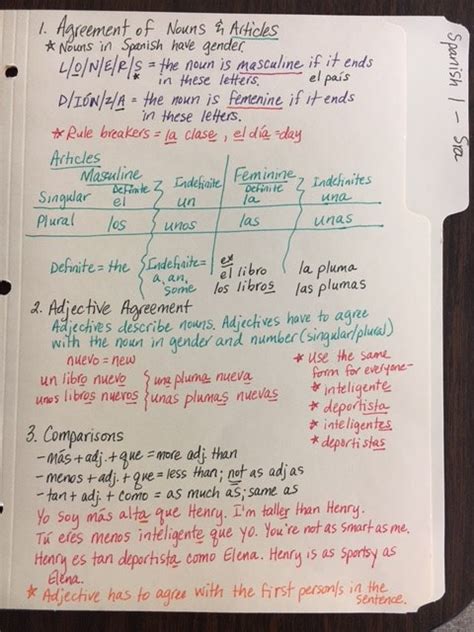Are you gearing up for your Spanish 1 final exam? Don’t fret! This comprehensive guide will empower you with all the essential information and strategies to excel in your exam.

Exam Structure and Content
The Spanish 1 final exam typically encompasses various sections to assess your proficiency in different language skills. Here’s a general overview:
- Listening Comprehension (25%)
- Speaking (25%)
- Reading Comprehension (20%)
- Grammar and Vocabulary (20%)
- Culture and History (10%)
Effective Study Strategies
To tackle the exam confidently, it’s crucial to implement effective study strategies. Consider the following:
- Immerse Yourself in Spanish: Surround yourself with the language through movies, music, books, and online resources.
- Practice Regularly: Dedicate consistent time to practicing your speaking, listening, reading, and writing skills.
- Seek Support from Others: Join study groups or connect with a tutor or language partner for additional support and feedback.
- Focus on High-Frequency Words and Grammar: Identify and memorize commonly used vocabulary and grammar structures to build a solid foundation.
- Utilize Technology: Leverage online apps and websites to enhance your learning experience through interactive exercises and authentic content.
Specific Exam Preparation Tips
Listening Comprehension
- Preview the Material: Familiarize yourself with the topics that may be covered in the listening section.
- Practice Active Listening: Focus on understanding the main ideas and key details while listening.
- Predict and Infer: Anticipate what the speaker might say based on the context and your background knowledge.
Speaking
- Prepare Common Phrases: Memorize essential conversational phrases related to greetings, introductions, and basic interactions.
- Practice Spontaneous Speech: Engage in conversations with others or record yourself speaking to improve your fluency and confidence.
- Pay Attention to Pronunciation: Pronounce words and phrases correctly to convey your message effectively.
Reading Comprehension
- Read Diverse Texts: Expose yourself to different types of written materials, such as articles, stories, and descriptions.
- Identify Main Ideas and Supporting Details: Determine the central theme and supporting arguments within the text.
- Use Context Clues: Infer the meaning of unfamiliar words based on their surrounding context.
Grammar and Vocabulary
- Review Key Grammatical Structures: Master verb conjugations, noun and adjective agreements, and sentence structure.
- Expand Your Vocabulary: Learn essential vocabulary related to common topics, such as travel, daily routines, and personal interests.
- Practice in Context: Use grammar and vocabulary in meaningful sentences and conversations to enhance your comprehension.
Culture and History
- Explore Spanish Culture: Learn about Spanish-speaking countries and their traditions, customs, and historical landmarks.
- Read Cultural Articles: Gain insights into Spanish art, music, literature, and societal norms.
- Discuss Cultural Topics: Engage in discussions with others to expand your understanding of Spanish culture and history.
Exam Day Strategies
- Arrive Early: Give yourself ample time to settle in and prepare your mind for the exam.
- Read Instructions Carefully: Ensure you understand the instructions for each section before beginning.
- Manage Your Time Wisely: Allocate your time effectively to complete all sections within the prescribed time limit.
- Don’t Skip Questions: If you’re unsure about an answer, skip it and come back to it later.
- Check Your Work: Review your answers thoroughly before submitting your exam.
Example Questions and Answers
Listening Comprehension:
- Question: ¿Qué dice el locutor sobre el tiempo hoy?
- Answer: Hoy hace mucho sol y hace calor.
Speaking:
- Prompt: Describe your morning routine.
- Answer: Por la mañana, me despierto a las 7, me ducho, me visto y desayuno.
Reading Comprehension:
- Passage: El fútbol es un deporte muy popular en España.
- Question: ¿Qué deporte es popular en España?
- Answer: Fútbol
Grammar and Vocabulary:
- Conjugate: Hablar (present tense, yo)
- Answer: Hablo
Culture and History:
- Question: ¿Qué es la Alhambra?
- Answer: Un palacio histórico en Granada, España
Additional Resources
-
Spanish Language Resources:
- https://www.spanishdict.com/
- https://www.duolingo.com/
-
Spanish History and Culture:
- https://www.britannica.com/place/Spain
- https://www.nationalgeographic.com/travel/countries/spain/
Conclusion
With dedicated preparation and effective exam strategies, you can confidently tackle your Spanish 1 final exam and achieve success. Remember to immerse yourself in the language, practice regularly, and seek support whenever needed. Best wishes on your exam journey!
